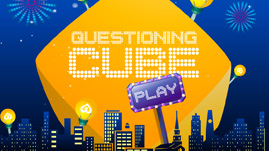Teachers' Domain - Digital Media for the Classroom and Professional Development
User: Preview




The Questioning Cube Game is part of WPSU’s Blue Ribbon Readers, a collection of seven interactive games designed to help elementary school students gain reading comprehension competences. In the game students practice asking questions about short stories or passages of expository prose. The practice of generating and answering their own questions before, during and after reading, helps students actively create solid mental connections.
The Questioning Cube Game is part of WPSU’s Blue Ribbon Readers, a collection of seven interactive games designed to help elementary school students gain reading comprehension competences. In the game students practice asking questions about short stories or passages of expository prose. The practice of generating and answering their own questions before, during and after reading, helps students actively create solid mental connections.
Questions create and strengthen students’ dialogue and emotional connections with stories and help them clarify ideas and understanding. Encourage students to ask why, what, where, who, and how, when reading a poem or a story, by modeling asking questions. Use questions as a way to make sense, to inspire wonder, or to highlight the power of thinking outside the box.
Heather teaches in a rural elementary school in Pennsylvania, a school so small that there is only one class for each grade. When she implemented The Questioning Cube Game along with other games designed to support reading strategies, her students’ test scores increased. Heather likes the idea that she can assign games to students to target areas where they need more practice. While some students are playing the games on their computers, Heather is free to work one-on-one with a student, or with a small reading group. Blue Ribbon Readers is like having an extra pair of hands in the classroom.
Heather and other teachers know that sounding out words and decoding are the first steps in teaching children to read. Teaching reading comprehension, however, has been a difficult task for educators for decades. Before extensive literacy research conducted in the 1980s, there were few evidence-based approaches for teaching comprehension. Some approaches increased reading levels and test scores while others had little success. Literacy experts Susan Zimmermann and Chryse Hutchins offer 7 Keys to Comprehension: How to Help Your Kids Read It and Get It to help both teachers and parents employ successful approaches. Zimmermann and Hutchins contend that,
“Real comprehension has to do with thinking, learning, and expanding a reader’s knowledge and horizons. It has to do with building on past knowledge, mastering new information, connecting with the minds of those you’ve never met.” p. 7
WPSU used the Zimmermann Hutchins book as a guide to build Blue Ribbon Readers, believing that in addition to their successful approaches, practice is a crucial element. With the book as a foundation, WPSU worked with Penn State literacy faculty members and practicing classroom teachers, like Heather, to develop games like The Questioning Cube Game.
Skills practice can be tedious, and keeping children engaged long enough for them to build their skill base can be challenging. Thus, WPSU designed The Questioning Cube Game as part of the Blue Ribbon Readers collection, seven separate engaging games that correspond with the 7 keys to comprehension referenced above.
 Loading Standards
Loading Standards